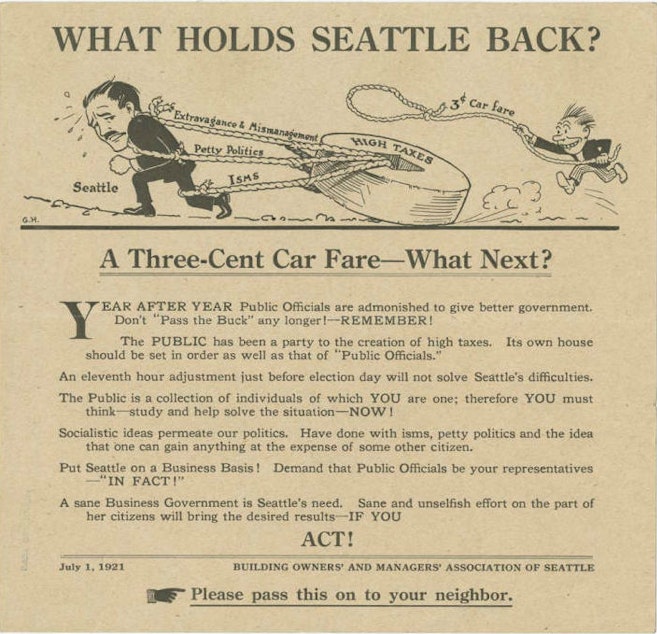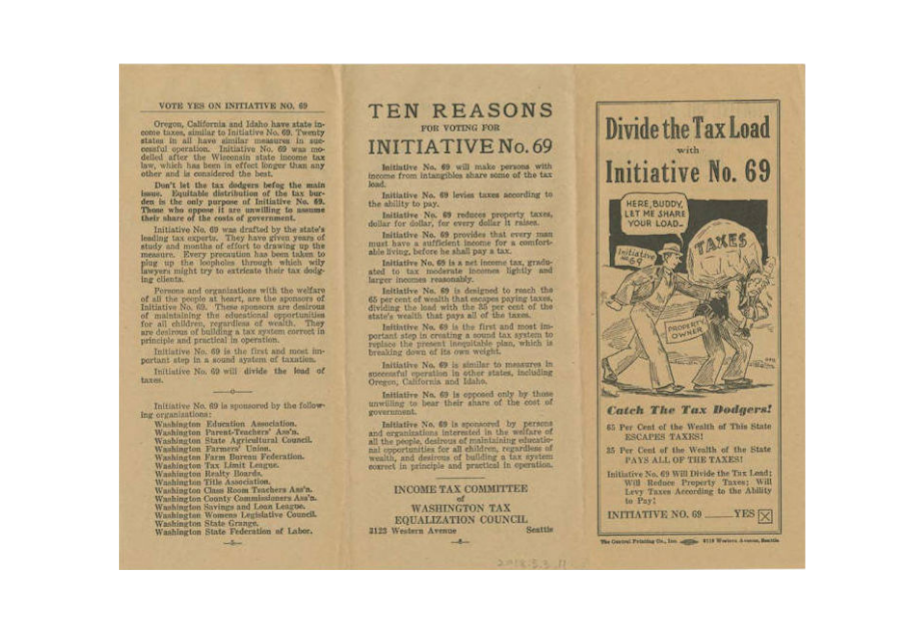Seattle has been whining about the same things forever. Here is proof

Does Seattle have a particular complaining style?
We discuss that on our latest episode of the SoundQs podcast … where we tell you that some kvetching is healthy.
While reporting for this episode, I came across early complaints about Seattle … which were reminiscent of complaints we hear today.
Complaint: Car Fees
Year: 1921

Nearly a century before Tim Eyman’s chair escapades and car-tab ballot initiatives, the Building owners’ and Managers’ Association of Seattle complained about potentially raising a “fare” on cars by 3 cents.
While the context of the car fee issue today is different (Eyman’s initiative would reduce the already existing fees that were approved by voters in 2016—and many in Seattle would be quicker to complain about Tim Eyman over car tab fees), the argument made by this group and Eyman is virtually the same.
Eyman claims that voters "are getting ripped off by Sound Transit, ripped off by the state, ripped by skyrocketing property taxes, high gas taxes,” and that our car-tab fees contribute to what amounts to an already undue burden.
This handbill alleges that those extra 3 cents would weigh down Seattle taxpayers.
Eyman’s measure to cap car-tab fees at $30 will appear on the November 2019 ballot for Washington voters.
Complaint: Rain
Year: 1863
Can a complaint be iconic?
If so, complaining about the rain in Seattle is legendary. It rains here a lot—but not as much as other cities with sunnier reputations like Miami and Houston. But be careful not to complain too much about the rain, lest “true” Seattleites tell you to go back where you came from.
See also: People who judge people who use umbrellas; people who are tired of being judged for using umbrellas; people who use umbrellas but didn’t use to, but say they must now because the rain is coming down harder now than in the 90s.
Crosscut writer and Seattle historian Knute Berger sent me this poem he found on Washington Secretary of State’s digital archives entitled “The Rain” that appeared in the December 10, 1863 issue of Seattle’s first newspaper, The Seattle Gazette:

Complaint: Washington state doesn’t have an income tax
Year: 1932
There’s a lot of historic angst about taxes in Washington state.
The root of a lot of that angst has to do with the state’s history with the income tax specifically. The 1932 pamphlet above advocated for Initiative 69, a measure that would establish a graduated income tax. It passed overwhelmingly. So why don’t we have one now?
Long story short, the Washington State Supreme Court ruled in 1933 that the tax violated the Washington state constitution. Ever since then, a large swath of Seattleites (and in Washington state) have complained about how the lack of an income tax here makes it difficult to fund basic government functions. Ever heard of that thing called McCleary?

Complaint: Itchy, smelly Green Lake
Year: 1938
Until relatively recently, a condition nicknamed the “Green Lake itch” was a thing. It was the result of pollution in Green Lake that also made the lake smell.
According to King County, Green Lake is currently clean and safe to swim in. This followed a major cleanup effort in the early 2000s. But before that though, the smell of Green Lake fueled many a complaint. Including in this Sanitary Survey from 1938 that cited its “objectionable odor.”
Another Green Lake-related complaint: which way to walk around the lake.




